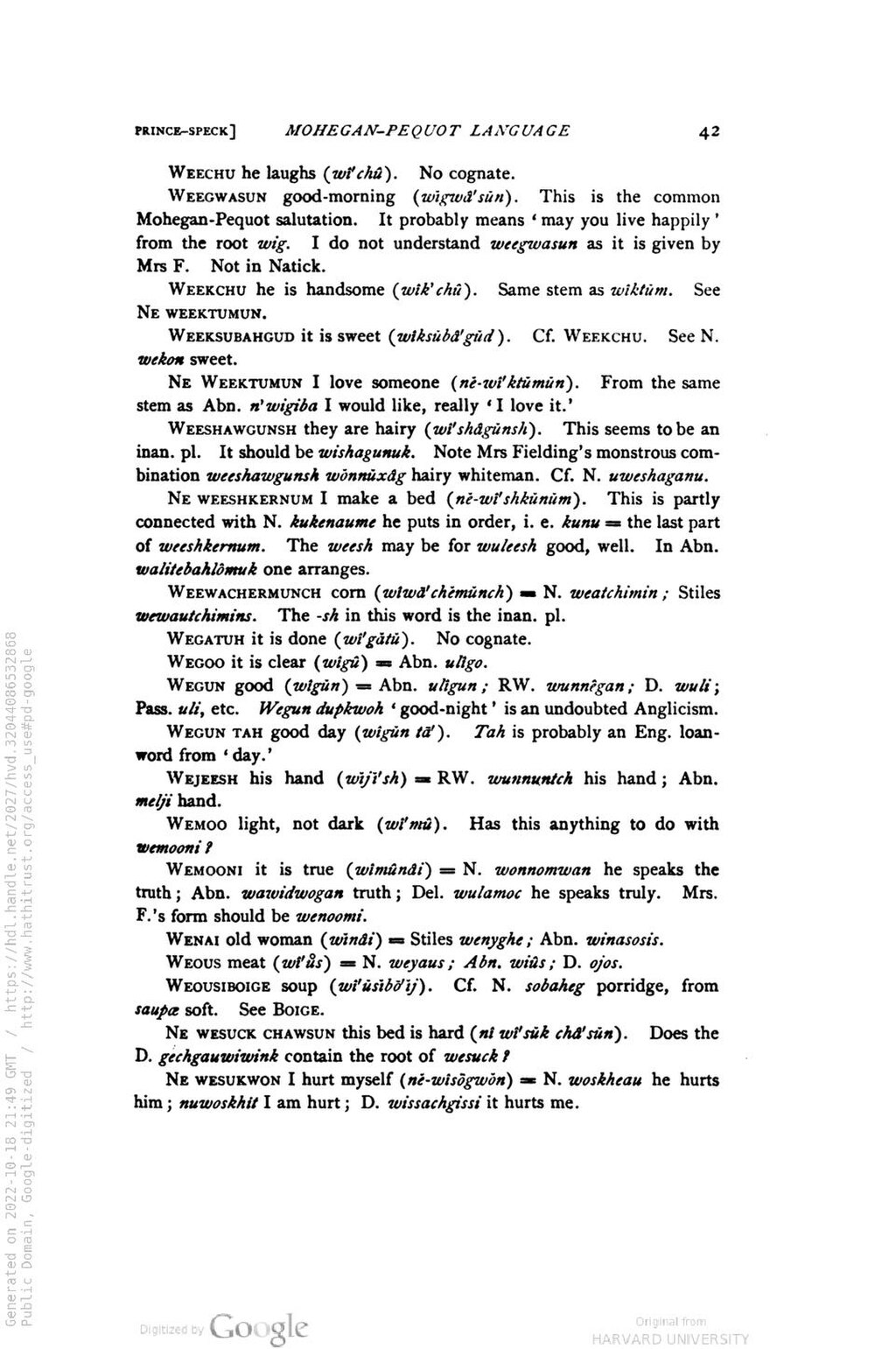Weechu he laughs (wî'chû). No cognate.
Weegwasun good-morning (wîgwâ'sŭn). This is the common Mohegan-Pequot salutation. It probably means ‘may you live happily’ from the root wig. I do not understand weegwasun as it is given by Mrs F. Not in Natick.
Weekchu he is handsome (wîk’chû). Same stem as wîktŭm. See Ne weektumun.
Weeksubahgud it is sweet (wîksŭbâ'gŭd). Cf. Weekchu. See N. wekon sweet.
Ne Weektumun I love someone (nĕ-wî'ktŭmŭn). From the same stem as Abn. n’wigiba I would like, really ‘I love it.’
Weeshawgunsh they are hairy (wî'shâgŭnsh). This seems to be an inan. pl. It should be wishagunuk. Note Mrs Fielding’s monstrous combination weeshawgunsh wŏnnŭxâg hairy whiteman. Cf. N. uweshaganu.
Ne weeshkernum I make a bed (nĕ-wî'shkŭnŭm). This is partly connected with N. kukenaume he puts in order, i. e. kunu = the last part of weeshkernum. The weesh may be for wuleesh good, well. In Abn. walitebahlômuk one arranges.
Weewachermunch corn (wîwā'chĕmŭnch) = N. weatchimin; Stiles wewautchimins. The -sh in this word is the inan. pl.
Wegatuh it is done (wî'gătŭ). No cognate.
Wegoo it is clear (wîgû) = Abn. ulîgo.
Wegun good (wîgŭn) = Abn. ulîgun; RW. wunnêgan; D. wuli; Pass. uli, etc. Wegun dupkwoh ‘good-night’ is an undoubted Anglicism.
Wegun tah good day (wîgŭn tā'). Tah is probably an Eng. loanword from ‘day.’
Wejeesh his hand (wĭjĭ'sh) = RW. wunnuntch his hand; Abn. melji hand.
Wemoo light, not dark (wî'mû). Has this anything to do with wemooni?
Wemooni it is true (wîmûnâi) = N. wonnomwan he speaks the truth; Abn. wawidwogan truth; Del. wulamoc he speaks truly. Mrs. F.’s form should be wenoomi.
Wenai old woman (wĭnâi) = Stiles wenyghe; Abn. winasosis.
Weous meat (wî'ůs) = N. weyaus; Abn. wiûs; D. ojos.
Weousiboige soup (wî'ŭsĭbō'ĭj). Cf. N. sobaheg porridge, from saupæ soft. See Boige.
Ne wesuck chawsun this bed is hard (nî wî'sŭk châ'sŭn). Does the D. gechgauwiwink contain the root of wesuck?
Ne wesukwon I hurt myself (nĕ-wîsögwŏn) = N. woskheau he hurts him; nuwoskhit I am hurt; D. wissachgissi it hurts me.
